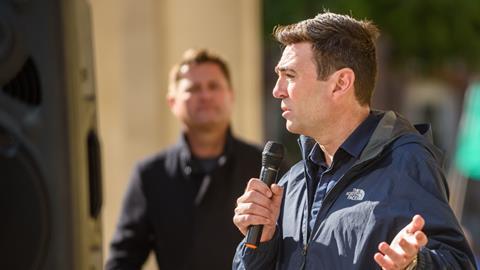Greater Manchester can bring air quality within legal limits without introducing a charging clean air zone (CAZ), the region’s mayor said.
Plans to launch a CAZ were put on hold in February 2022 as concerns grew that hauliers and other businesses would struggle to invest in cleaner vehicles and that the scheme would hit supply chains, as well as the cost and availability of second-hand vehicles.

Manchester mayor Andy Burnham said local authorities would refuse to implement a charging CAZ and the only way forward in a post-pandemic economy was for a non-charging zone to be introduced.
He said modelling now showed that investing in zero-emission electric buses and cleaner taxis, as well as measures for managing traffic flows, would help improve air quality and bring it within legal limits for nitrogen dioxide by 2025.
The modelling also revealed that a charging CAZ would not achieve compliance by 2026 and would therefore fail to meet the government’s own compliance date.
Councillor Eammon O’Brien, leader of Bury Council and clean air lead for Greater Manchester, said: “We want to do the right thing in the right way, using an investment-led, non-charging plan to clean the air in a supportive and transitional way that does not create the risk of financial hardship.
“While we can now prove our case for an investment-led plan, modelling shows that we can’t achieve compliance through a charging Clean Air Zone by 2026. There is now a compelling case for what Greater Manchester has set out – a plan that is fairer, cheaper, more affordable and more democratic.”
The RHA welcomed the city’s approach: “We’re pleased that Transport for Greater Manchester will invest in cleaner air technologies rather than charge drivers to enter a clean air zone to tackle pollution in the city,” said Chris Ashley, RHA policy lead, environment and vehicles.
“We’re committed to working with government, local authorities and others on workable solutions to improve air quality which avoid causing financial problems for communities and businesses.
“We’re calling for greater investment in zero-emission infrastructure and an emissions-linked rebate to encourage the uptake of cleaner fuels such as HVO to speed up the transition away from fossil fuels.”

















